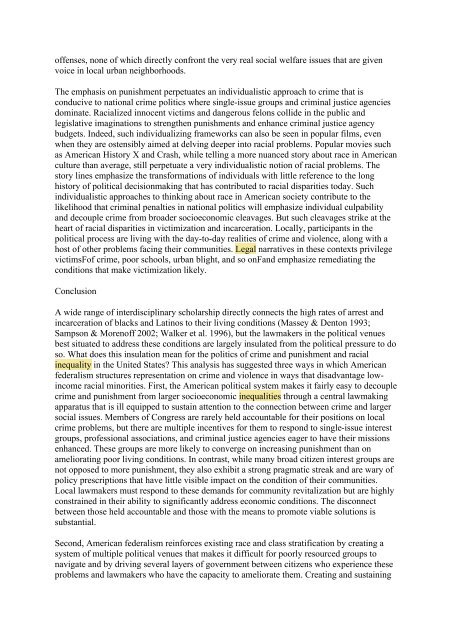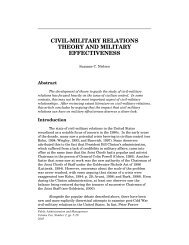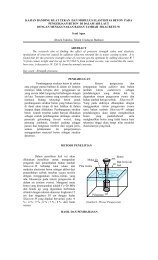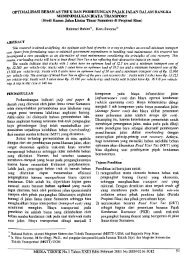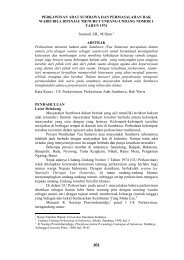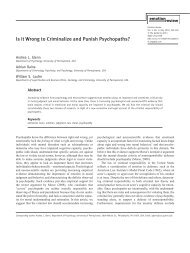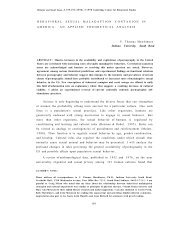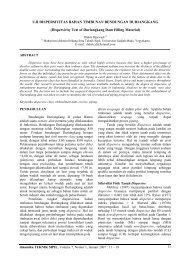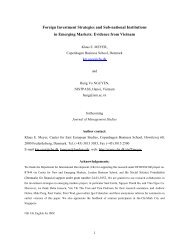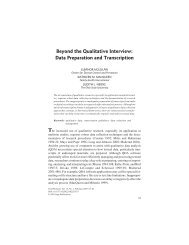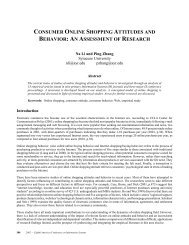The Invisible Black Victim: How American Federalism Perpetuates ...
The Invisible Black Victim: How American Federalism Perpetuates ...
The Invisible Black Victim: How American Federalism Perpetuates ...
You also want an ePaper? Increase the reach of your titles
YUMPU automatically turns print PDFs into web optimized ePapers that Google loves.
offenses, none of which directly confront the very real social welfare issues that are given<br />
voice in local urban neighborhoods.<br />
<strong>The</strong> emphasis on punishment perpetuates an individualistic approach to crime that is<br />
conducive to national crime politics where single-issue groups and criminal justice agencies<br />
dominate. Racialized innocent victims and dangerous felons collide in the public and<br />
legislative imaginations to strengthen punishments and enhance criminal justice agency<br />
budgets. Indeed, such individualizing frameworks can also be seen in popular films, even<br />
when they are ostensibly aimed at delving deeper into racial problems. Popular movies such<br />
as <strong>American</strong> History X and Crash, while telling a more nuanced story about race in <strong>American</strong><br />
culture than average, still perpetuate a very individualistic notion of racial problems. <strong>The</strong><br />
story lines emphasize the transformations of individuals with little reference to the long<br />
history of political decisionmaking that has contributed to racial disparities today. Such<br />
individualistic approaches to thinking about race in <strong>American</strong> society contribute to the<br />
likelihood that criminal penalties in national politics will emphasize individual culpability<br />
and decouple crime from broader socioeconomic cleavages. But such cleavages strike at the<br />
heart of racial disparities in victimization and incarceration. Locally, participants in the<br />
political process are living with the day-to-day realities of crime and violence, along with a<br />
host of other problems facing their communities. Legal narratives in these contexts privilege<br />
victimsFof crime, poor schools, urban blight, and so onFand emphasize remediating the<br />
conditions that make victimization likely.<br />
Conclusion<br />
A wide range of interdisciplinary scholarship directly connects the high rates of arrest and<br />
incarceration of blacks and Latinos to their living conditions (Massey & Denton 1993;<br />
Sampson & Morenoff 2002; Walker et al. 1996), but the lawmakers in the political venues<br />
best situated to address these conditions are largely insulated from the political pressure to do<br />
so. What does this insulation mean for the politics of crime and punishment and racial<br />
inequality in the United States? This analysis has suggested three ways in which <strong>American</strong><br />
federalism structures representation on crime and violence in ways that disadvantage lowincome<br />
racial minorities. First, the <strong>American</strong> political system makes it fairly easy to decouple<br />
crime and punishment from larger socioeconomic inequalities through a central lawmaking<br />
apparatus that is ill equipped to sustain attention to the connection between crime and larger<br />
social issues. Members of Congress are rarely held accountable for their positions on local<br />
crime problems, but there are multiple incentives for them to respond to single-issue interest<br />
groups, professional associations, and criminal justice agencies eager to have their missions<br />
enhanced. <strong>The</strong>se groups are more likely to converge on increasing punishment than on<br />
ameliorating poor living conditions. In contrast, while many broad citizen interest groups are<br />
not opposed to more punishment, they also exhibit a strong pragmatic streak and are wary of<br />
policy prescriptions that have little visible impact on the condition of their communities.<br />
Local lawmakers must respond to these demands for community revitalization but are highly<br />
constrained in their ability to significantly address economic conditions. <strong>The</strong> disconnect<br />
between those held accountable and those with the means to promote viable solutions is<br />
substantial.<br />
Second, <strong>American</strong> federalism reinforces existing race and class stratification by creating a<br />
system of multiple political venues that makes it difficult for poorly resourced groups to<br />
navigate and by driving several layers of government between citizens who experience these<br />
problems and lawmakers who have the capacity to ameliorate them. Creating and sustaining


